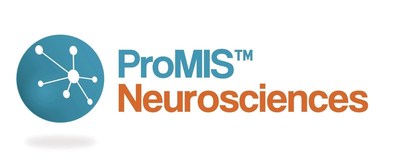ProMIS Neurosciences Announces Publication of Peer Reviewed Scientific Paper Describing a Novel Target on Toxic Oligomers of Amyloid Beta in Alzheimer's Disease
Scientific Publication Describes One of Six Distinct Therapeutic Targets on Toxic Prion-Like Amyloid Beta Oligomers
TORONTO and CAMBRIDGE, MA, April 10, 2018 /PRNewswire/ - ProMIS Neurosciences, Inc., a biotechnology company focused on the discovery and development of precision treatments for neurodegenerative diseases, today announced publication of a peer reviewed scientific paper describing one of six distinct therapeutic targets (epitopes) on toxic oligomers of amyloid beta (AbO) identified in the lab of ProMIS Chief Scientific Officer, Dr. Neil Cashman.

Commenting on the announcement, ProMIS President and CEO, Dr. Elliot Goldstein, stated: "This publication describes in detail the first of six distinct therapeutic targets on toxic AbO identified by the ProMIS scientific team. Monoclonal antibodies directed against each of these six targets have been generated. ProMIS now has lead and backup antibodies addressing what we believe to be the full complement of potential targets on toxic AbO, the latter considered to be a root cause of Alzheimer's disease".
The scientific paper by Silverman et al. entitled, A Rational Structured Epitope Defines a Distinct Subclass of Toxic Amyloid-beta Oligomers was published in the online edition of the American Chemical Society Journal, Chemical Neuroscience (ACS Chem. Neurosci., April 4, 2018).
In this paper, the authors describe and analyze the sequence and cyclical shape (conformation) of the epitope labeled cSNK which is displayed by AbOs present in brain tissue and cerebrospinal fluid (CSF) from Alzheimer's disease (AD) patients but not in normal brain tissue. A monoclonal antibody (mAb) directed against this target has been shown to selectively bind the toxic AbO, with virtually no off-target binding to non-toxic Ab monomers and fibrils. Furthermore, this mAb, to be referred to as PMN300, showed blocking of AbO neurotoxicity and propagation in both in vitro and in vivo settings.
ProMIS' AD program consists of six series of mAb therapeutic candidates (identified as PMN300, PMN310, PMN320, PMN330, PMN340 and PMN350), each selectively targeting one of the six distinct epitopes on AbO. The most advanced lead therapeutic candidate is PMN310, scheduled for clinical trial initiation in 2019.
About ProMIS Neurosciences, Inc.
ProMIS Neurosciences is a development stage biotechnology company focused on discovering and developing precision medicine therapeutics to treat neurodegenerative diseases, in particular Alzheimer's disease (AD) and amyotrophic lateral sclerosis (ALS). The Company's proprietary target discovery engine is based on the use of two complementary techniques. The Company applies its thermodynamic, computational discovery platform—ProMIS™ and Collective Coordinates — to predict novel targets known as Disease Specific Epitopes (DSEs) on the molecular surface of misfolded proteins. Using this unique precision medicine approach, the Company is developing novel antibody therapeutics and specific companion diagnostics for AD and ALS. ProMIS is headquartered in Toronto, Ontario, with offices in Cambridge, Massachusetts. ProMIS is listed on the Toronto Stock Exchange under the symbol PMN.TO, and on the OTCQB Venture Market under the symbol ARFXF.
For further information please consult the Company's website at: www.promisneurosciences.com
Follow us on Twitter
Like us on LinkedIn
Neither the TSX nor its Regulation Services Provider (as that term is defined in the policies of the TSX) accepts responsibility for the adequacy or accuracy of this release. This news release contains certain "forward-looking statements" within the meaning of Canadian securities legislation. Forward-looking statements are statements that are not historical facts; they are generally, but not always, identified by the words "expects", "plans", "anticipates", believes", "intends", "estimates", "projects", "aims", "potential", "goal", "objective", "prospective", and similar expressions, or that events or conditions "will", "would", "may", "can", "could" or "should" occur. Forward-looking statements are based on the beliefs, estimates and opinions of the Company's management on the date the statements are made and they involve a number of risks and uncertainties. Consequently, there can be no assurances that such statements will prove to be accurate and actual results and future events could differ materially from those anticipated in such statements. Except as required by the securities disclosure laws and regulations applicable to the Company, the Company undertakes no obligation to update these forward-looking statements if management's beliefs, estimates or opinions, or other factors, should change.
![]() View original content with multimedia:http://www.prnewswire.com/news-releases/promis-neurosciences-announces-publication-of-peer-reviewed-scientific-paper-describing-a-novel-target-on-toxic-oligomers-of-amyloid-beta-in-alzheimers-disease-300626710.html
View original content with multimedia:http://www.prnewswire.com/news-releases/promis-neurosciences-announces-publication-of-peer-reviewed-scientific-paper-describing-a-novel-target-on-toxic-oligomers-of-amyloid-beta-in-alzheimers-disease-300626710.html
SOURCE ProMIS Neurosciences Inc.
Released April 10, 2018